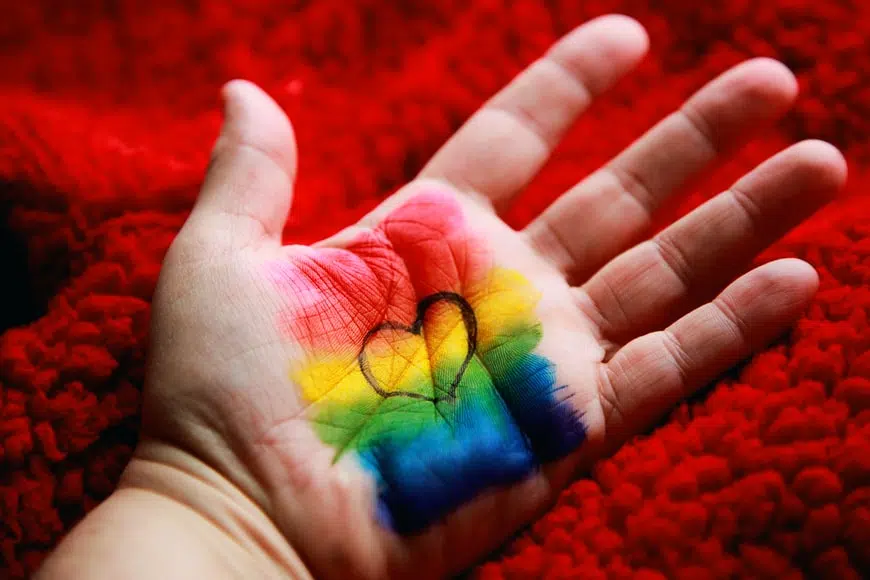The most common feeling the public have towards LGBT people is one of respect, according to a report by Stonewall.

The charity launched the report ahead of Pride Month this June and it found that women and younger people are more likely to have positive feelings towards LGBT people than men and older people, a pattern that is common across a wide range of social attitudes.
“Perhaps most interestingly, given the high level of focus on trans people in the UK press, and the very negative tone of much of that coverage, the way the public feels is consistent across lesbian, gay, bi and trans people,” said the report.
This year marks 50 years since the first Pride march in London and the charity says that in 2022, the UK is a country that is proud to be inclusive; one where its people are increasingly embracing their LGBTQ+ neighbours, colleagues, family and friends.
For the survey Stonewall asked just over 2000 adults living across the UK how they feel about lesbian, gay, bi and trans people in December 2021. The charity asked separately about each of our communities and offered respondents the opportunity to tick as many options as they wanted to. The options provided were: respect, admiration, pity, disgust, resentment, fear and envy, as well as ‘can’t choose’ and ‘prefer not to say’.
The survey revealed that a significant proportion of the public also feel admiration for LGBT communities. Stonewall comments that, like respect, admiration is an actively positive feeling, so it is striking how common this answer is. However the public were significantly less likely to say they admire bi people than lesbian, gay or trans people. Stonewall says this could be attributed to biphobia given that biphobic stereotypes include the idea that bi people are untrustworthy or unreliable. Feelings of admiration are highest for trans people, perhaps reflecting public acknowledgement of the challenges faced by trans people living in the UK today, the survey adds.
Overall, the public is far less likely to feel pity for members of the LGBT community than it is to respect or admire them. While 7% of people surveyed felt ‘pity’ for gay, lesbian and bisexual people, twice as many – 15% - said they feel pity when they think about trans people.
Thankfully, feelings of disgust are not commonplace among members of the public. However, 50 years after the first pride march on the streets of London, a small but significant cohort of the public feel actively disgusted by LGBT people. The survey found 7% felt disgust towards lesbians, 9% felt disgust towards gay men, and 8% felt disgust to bisexual people and trans people.
“These feelings of disgust are core to homophobia, biphobia and transphobia, and people who feel this way risk causing harm to LGBT people in their lives,” said the report.
“It is also striking how consistent the picture is across communities. It is thankfully far rarer than it once was to hear disgust expressed about lesbian, gay or bi people in our public conversation and our press. But it is commonplace to hear stories about trans people, and in particular trans people’s bodies, that are steeped in disgust. This is often reflected in media discourse about trans people and their rights. This data suggests that our media is amplifying a minority and harmful view, rather than reflecting more widely held sentiment,” it added.
Feelings of resentment, and feelings of envy are even less common, and consistent across all of our communities with just 3-4% feeling resentment and 2-3% feeling envy.
Finally, as with other negative emotions, only a small percentage of the public are fearful of members of the LGBT community, and this percentage is consistent across all identity groups.
“According to the British Social Attitudes survey in 1987, at the height of the AIDS epidemic and the dawn of Section 28, three-quarters of the public said they felt that a same-sex relationship was either ‘always’ or ‘mostly’ wrong. These attitudes were often fuelled by sensationalist, homophobic reporting in our press,” said the report.
“35 years on, the world has changed, even if the headlines haven’t. Our research shows that today, the UK public is significantly more likely to take pride in supporting the LGBTQ+ community than it is to find them ‘wrong’. One in three people reported they actively ‘respect’ us, and one in five declared ‘admiration’. Less than one in 20 reported feelings of ‘envy’, ‘resentment’ or ‘fear’,” it added.
Stonewall concludes that while there has been much progress, there is still a long way to go until all LGBTQ+ people are free to be ourselves in every corner of our lives.
The charity urges Prime Minister of Great Britain and Northern Ireland Boris Johnson, the First Minister of Scotland Nicola Sturgeon and the First Minister of Wales Mark Drakeford to show leadership to progress rights for LGBTQ+ people.

